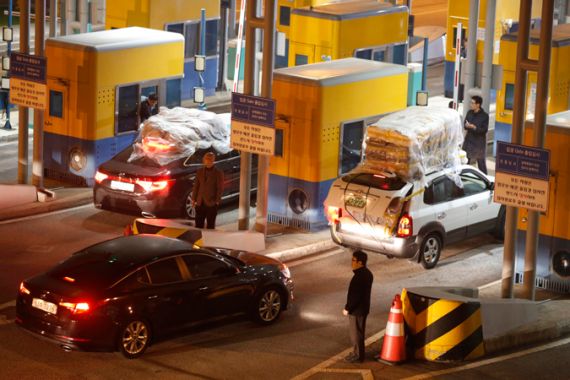S Korea rally presses for Kaesong reopening
About 53,000 mostly North Korean workers lost their jobs when the joint industrial complex was shut down amid tensions.

Hundreds of South Korean workers have staged a rally calling on political leaders in Seoul and Pyongyang to reopen the a joint industrial complex in North Korea.
About 250 people, including business owners, gathered on Thursday in the South Korean border town of Paju, near a bridge connecting the two countries, to demand the resumption of business operation in Kaesong.
Keep reading
list of 4 itemsChina’s economy beats expectations, growing 5.3 percent in first quarter
Inside the pressures facing Quebec’s billion-dollar maple syrup industry
Manipur’s BJP CM inflamed conflict: Assam Rifles report on India violence
“The Kaesong Industrial Complex which was our living foundation providing the happiness has now disappeared,” said Lee Im-dong, a Kaesong business leader. “Who took our job? Who made us this desperate?”
“We want the unconditional normalisation of the Kaesong complex. The Kaesong workers want their jobs back,” Lee said.
The workers had planned to hold a rally at the bridge, but it was stopped by police for lack of permit to protest.
About 53,000 mostly North Korean workers lost their jobs when Kaesong was closed during a spike in tensions last April.
More than 120 South Korean businesses have invested in the border complex at Kaesong, the last remaining symbol of cooperation between North and South Korea.
Business owners and workers wanted the South Korean Unification Ministry to approve their visit to the complex, but no response came from the ministry, so all returned home.
Recently, North Korea said South Korean businessmen could enter the jointly run industrial park.
In a statement carried by the North’s official media on Tuesday, the government agency in charge of relations with Seoul said Pyongyang was ready to talk about reopening the Kaesong complex if the business owners visit.
South Korea’s Unification Ministry urged the North to have talks with the government, not civilians but gave no further comment.
Recent tension has been fuelled by North Korean anger over the imposition of UN sanctions after its last nuclear arms test in February, creating one of the worst periods of tension on the peninsula since the end of the Korean War in 1953.